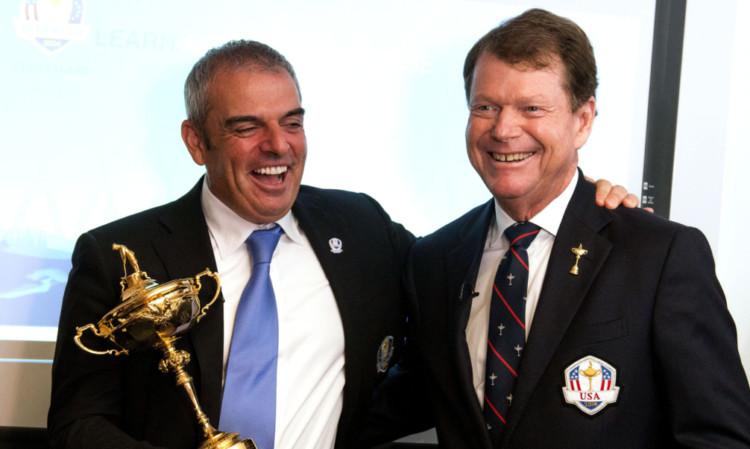Whenever Tom Watson has spoken about his role as Ryder Cup captain he has been at pains to stress his desire, and of opposite number Paul McGinley, that the 40th contest at Gleneagles be played in the right spirit.
But scratch beneath the surface of the platitudes and it does not take long to realise just how badly Watson wants to regain the trophy after years of European domination.
Europe have won seven of the last nine biennial contests, causing the PGA of America to ask Watson to reprise his role as captain at The Belfry in 1993, the last time the United States tasted success on European soil.
Watson will be 65 by the time of the matches on September 26-28 next year but has lost none of the competitive fire which almost saw him pull off a fairytale sixth Open Championship victory at the age of 59 at Turnberry in 2009.
Take for example his suggestion that the purest form of the Ryder Cup would see teams revert to 12 automatic qualifiers and no wild cards, because then he would know for sure which players “want to make it the worst way.”
Then there is his description of watching Europe’s remarkable fightback in the ‘Miracle at Medinah’ last year and having a terrible feeling in the pit of his stomach because he could not do anything about it.
And last but not least is his vow that he will not play anyone who is out of form just for the sake of giving them experience before the singles.
“I will be honest with the players, if you’re not playing very well you might not play very much. That’s the way I handled 1993,” said Watson, who gave Lee Janzen, Chip Beck and John Cook only one game each before the singles 20 years ago.
“I think the team got behind me in 1993 and said we are going to win this no matter what. That’s my call, that’s where I get second-guessed but I will take the arrows.”
That is certainly where Watson’s predecessor Davis Love came in for criticism, acceding to a request from Phil Mickelson and Keegan Bradley to be rested for the Saturday afternoon fourballs at Medinah.
The pair had won all three of their previous matches comfortably, including needing just 12 holes to thrash Lee Westwood and Luke Donald on Saturday morning. Europe split the afternoon session 2-2 and then came from 10-6 down in the singles, where a “refreshed” Mickelson and Bradley lost anyway to Justin Rose and Rory McIlroy respectively.
Love did at least have the nerve to sit out Tiger Woods for a session for the first time in the world number one’s Ryder Cup or Presidents Cup career, although Woods still only managed half a point from four matches.
Anyone expecting Watson to be able to explain Woods’ poor record in the Ryder Cup should not hold their breath however.
“Search me. It’s an enigma to me. I don’t know,” Watson admits.
And when Watson’s previous criticism of Woods’ on and off-course behaviour is factored in, it is no wonder that Watson wants to sit down with the 14-time major winner to clear the air.
Whether or not he succeeds remains to be seen, but the impression remains that McGinley’s captaincy will be a study in meticulous preparation while Watson is projecting a slightly more laissez-faire approach.
“The main thing I do is have their backs,” he says of his players. “I cover them, I make sure they have what they need, their clothes fit, all the mundane stuff, but the bottom line is that I am a stage manager, they are the actors and they go out and perform.
“Medinah was great theatre and a great match, just the wrong team won.”
